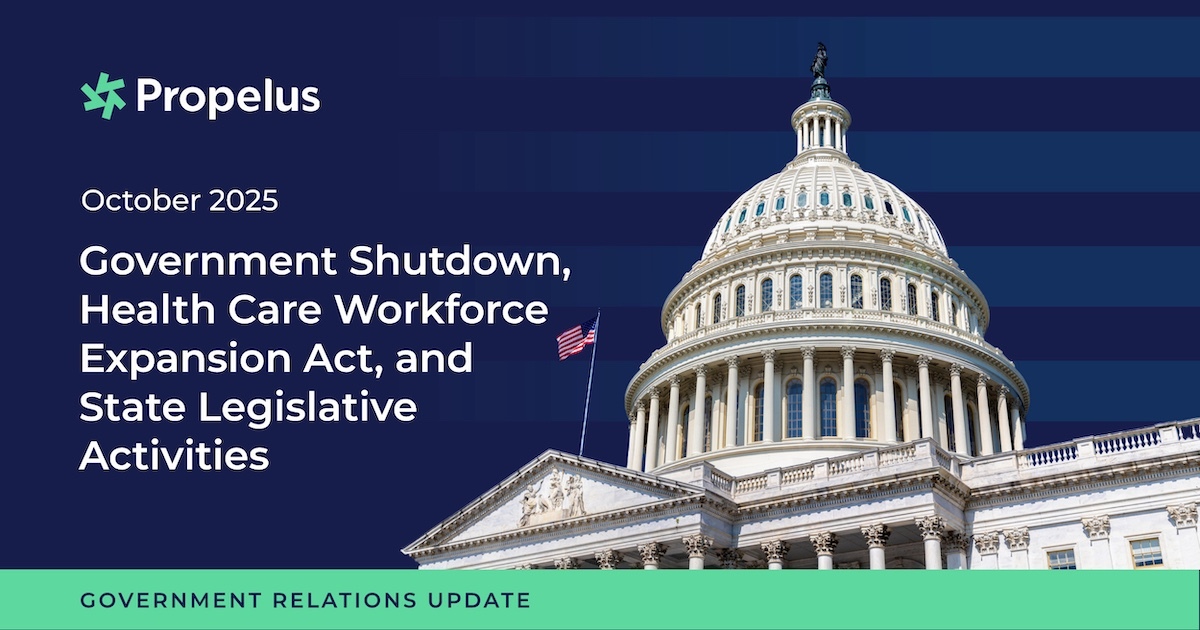
- #Government Relations
- #Healthcare Policy
- #Government Shutdown
- #Telehealth
- #Healthcare Workforce
This October update arrives amid significant federal uncertainty, as a partial government shutdown, the first of President Donald Trump’s second term, continues to dominate headlines and challenge essential services, including telehealth claims processing. Beyond the impasse in Washington, we’ll examine a major new legislative push to expand the healthcare workforce and highlight crucial state-level actions, including California’s groundbreaking AI transparency law, Connecticut’s full implementation of the Nurse Licensure Compact, and updates to professional licensure in Idaho and the growing Counseling Compact. Read on for a detailed breakdown of the regulatory and legislative landscape you need to know.
Federal Activity
Government Shutdown Continues
As of October 15, the federal government remains in a partial shutdown that began at 12:01 a.m. EDT on October 1. This marks the first government shutdown during President Donald Trump’s second term and the first since the 2018–2019 impasse. The shutdown stems from Congress’s inability to pass appropriations legislation for the 2026 fiscal year, which commenced on October 1.
Approximately 900,000 federal employees have been furloughed, while an additional 700,000 continue to work without pay. Efforts to pass a continuing resolution (CR) to fund the government have so far been unsuccessful. On September 30, the Senate voted on two competing CR proposals—one from Democrats and one from Republicans—but both failed due to disagreements over extending expiring Affordable Care Act subsidies. Negotiations are ongoing, though significant partisan differences remain, especially concerning federal spending levels, foreign aid rescissions, and health insurance subsidies.
While essential healthcare services remain operational, telehealth providers are facing challenges. Delays in billing and claims processing have occurred due to furloughed administrative staff at the Centers for Medicare & Medicaid Services (CMS) and various state Medicaid agencies. These disruptions may result in payment delays, potentially affecting the availability and delivery of telehealth services.
The U.S. Senate remains in session and continues to consider the funding bill. Although the House of Representatives was originally scheduled to reconvene on October 14, 2025, Speaker Mike Johnson has directed members to remain in their home districts for the week.
Healthcare Workforce
The Health Care Workforce Expansion Act of 2025, introduced by Senators Sanders and Merkley, proposes tuition-free medical, dental, and nursing education for students who commit to working in underserved or rural areas for 10 years. The bill also allocates billions to expand medical and dental schools and adds over 50,000 new Medicare residency slots, prioritizing primary care and psychiatry. These efforts aim to address healthcare shortages and improve access to care in rural and underserved communities.
State Activity
California SB 243 – AI Chatbot Transparency Act
Signed into law by Governor Newsom on October 13, 2025, this legislation mandates that AI chatbot developers clearly disclose to users when they are interacting with an AI system rather than a human.
Connecticut fully implements Nurse Licensure Compact
Effective October 1, 2025, nurses licensed in CT (or other compact states) can practice across other compact states without additional licensing hurdles. This expands the NLC to 41 states.
Idaho Moves to Two-Year Professional Licensure Renewal Cycles
Effective October 14, 2025, the Idaho Division of Occupational and Professional Licenses (DOPL) transitioned many professional licenses from annual (1-year) renewals to biennial (2-year) renewal cycles. If you professionals were born in an odd-numbered year, the next renewal will be for a two year license. If professionals were born in an even numbered year, the 2025 renewal will remain a one year license but beginning in 2026 they will shift to a two year cycle. This change is intended to reduce the administrative burden and frequency of renewals for both licensees and the state.
Counseling Compact Now Active in Arizona and Minnesota
As of September 30, 2025, the Counseling Compact is officially operational in Arizona and Minnesota— the first states to complete all technical and regulatory requirements, including secure data sharing and system testing. Licensed Professional Counselors (LPCs) in Arizona and Licensed Professional Clinical Counselors (LPCCs) in Minnesota can now apply to practice across state lines via the Compact Connect platform. An additional 37 states and territories are still actively progressing through the necessary steps to implement the compact.
Takeaway
The landscape of government activity this month shows a clear split: Federal paralysis is causing disruption, particularly in healthcare administration and claims processing, while State-level progress continues to drive critical changes in professional licensure and technology regulation. It’s essential to monitor the ongoing funding negotiations and the fate of key legislation like the Health Care Workforce Expansion Act to prepare for future regulatory shifts. We’ll continue to track the resolution of the government shutdown and the growing momentum of state-based licensure compacts.
Please look for our next update as we continue to track these and other important developments that shape the regulated professions.